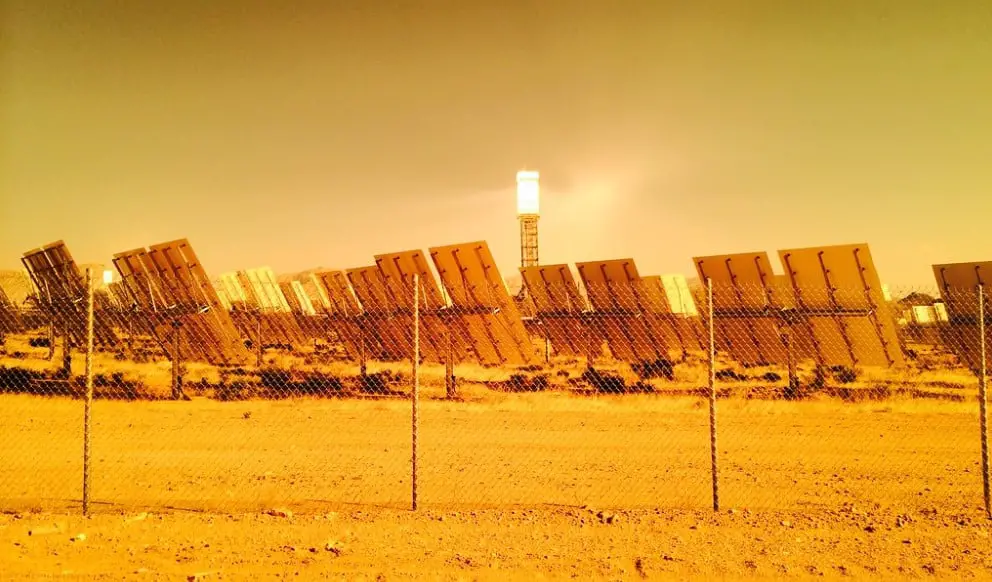What Type Of Energy Is Solar Energy
Solar energy is a form of potential energy. It originates from the nuclear fusion reactions occurring in the sun, which create electromagnetic radiation. This radiation travels through space as photons and can be converted into other forms of energy, such as heat and electricity, when it reaches Earth. Therefore, solar energy is considered potential energy because it has the potential to be converted into other forms of energy.
Picture yourself lounging on a sunny beach, sipping on an ice-cold lemonade. As you bask in the warmth of the sun’s rays, have you ever thought about where all that energy comes from?
The answer lies in solar energy – a type of renewable energy that has become increasingly popular over the years.
Simply put, solar energy is power that is harnessed directly from the sun. This form of renewable energy uses photovoltaic cells to convert sunlight into electricity that can be used to power homes and businesses.
In this article, we will explore what exactly solar energy is made up of and how it works. So sit back, relax and let’s dive into the world of solar power!
The Science Behind Solar Energy

Solar energy is a form of renewable energy that harnesses the power of solar radiation from the sun. This type of energy conversion process involves using photovoltaic cells to convert sunlight into electricity.
These cells are made up of semiconductors, which absorb photons from sunlight and release electrons, generating a flow of electric current.
One advantage of solar energy is its abundance and availability. The amount of solar radiation reaching Earth’s surface in an hour is enough to meet global energy needs for an entire year. Additionally, it produces no greenhouse gas emissions or other pollutants associated with fossil fuel combustion, making it a clean source of energy.
However, there are also some challenges associated with solar energy production. One challenge is the intermittent nature of sunlight due to weather conditions and changes in day-night cycles. As a result, storing excess electricity generated during peak hours can be difficult and expensive.
Despite these challenges, advancements in technology continue to make solar energy more accessible and cost-effective for homes and businesses alike.
Photovoltaic Cells: How They Work
Now that we understand the science behind solar energy, let’s take a closer look at how photovoltaic cells work. These are the devices responsible for converting solar energy into electricity that can be used to power our homes and businesses.
Solar panel construction is relatively simple in theory but requires precision engineering to ensure maximum efficiency. The panels consist of multiple layers, including a top layer of transparent glass or plastic, an anti-reflective coating, and a bottom layer made up of silicon cells.
When sunlight hits these cells, electrons are knocked loose from their atoms, creating a flow of electric current. The efficiency of solar panels varies depending on several factors, such as weather conditions and the angle and direction they’re facing.
However, advances in technology have led to increasingly efficient panels capable of generating more power even with less direct sunlight. As we continue to explore renewable energy sources like solar power, it’s likely that we’ll see even greater improvements in efficiency in the years ahead.
Advantages Of Solar Energy
Solar energy is a renewable source of power that harnesses the sun’s radiation to produce electricity. One of its most significant advantages is its positive impact on the environment.
Solar panels generate clean and emission-free energy, which reduces carbon footprint and air pollution. Unlike traditional sources like coal or gas, solar energy does not emit harmful greenhouse gases into the atmosphere that contribute to global warming.
Another advantage of solar energy is its cost-effectiveness in the long run. Although installing solar panels can be expensive initially, it pays off over time since sunlight is free and abundant. This means lower utility bills as less grid power will be needed to run households and businesses.
Additionally, many states offer incentives such as tax credits or rebates for using solar energy systems. The environmental benefits combined with its economic value make solar energy an attractive option for sustainable living.
As technology advances, it becomes more accessible and efficient, making it easier for people to switch to this alternative form of energy. As we shift towards cleaner and greener solutions, solar energy remains one of the best options available today.
Applications Of Solar Energy
Solar energy is a renewable source of energy that can be used in many different ways.
Residential solar applications include rooftop solar panels, solar water heating, and solar lighting.
On the other hand, commercial solar applications include solar energy for businesses, such as solar farms, solar parking lots, and industrial solar energy.
Let’s explore these applications further and discuss their benefits.
Residential Solar Applications
Are you tired of paying high electricity bills every month? If so, then residential solar applications might be the perfect solution for you. By installing solar panels on your home, you can generate clean and renewable energy that will significantly reduce your monthly expenses.
The efficiency of solar panels has greatly improved in recent years, making them a practical choice for homeowners looking to save money while reducing their carbon footprint. Solar panel efficiency is one of the critical factors when considering residential solar applications. It refers to how much energy the panel can convert from sunlight into usable electricity.
In the past, solar panels were only about 10-15% efficient, which made it difficult for them to compete with traditional sources of power. However, with advancements in technology, modern-day solar panels have an average efficiency rating of around 20%. This means they are more effective at harnessing sunlight and converting it into electricity than ever before.
One significant advantage of investing in residential solar applications is cost savings. While there is an initial upfront investment required to purchase and install the solar panels, over time, homeowners can expect significant reductions in their utility bills. According to studies conducted by the National Renewable Energy Laboratory (NREL), homes equipped with solar panels save an average of $50-$100 per month on their electricity costs.
Over ten or twenty years, these savings could add up to tens of thousands of dollars – a substantial return on investment! In conclusion, residential solar applications offer numerous benefits beyond just lower energy bills. They allow homeowners to take control of their energy usage while contributing towards a greener future. With increased efficiency ratings and cost savings potential, now is an excellent time to consider switching to renewable energy through residential solar installations.
Commercial Solar Applications
If residential solar applications can save homeowners money on their electricity bills, imagine the potential cost savings for businesses with higher energy consumption. This is where commercial solar applications come in.
Commercial establishments like office buildings, factories, and even schools can benefit greatly from installing solar panels on their properties. One significant advantage of commercial solar applications is that they offer an attractive return on investment.
The installation costs may be high initially but are offset by long-term cost savings generated through lower utility bills. Additionally, there are various financing options available to help cover these upfront expenses and make it more feasible for businesses to invest in renewable energy.
The process of installing solar panels in a commercial setting typically involves designing a customized system that meets the specific energy needs of the business. Factors such as roof space availability, orientation towards sunlight, and shading need to be taken into account during this stage.
Once installed, these systems require minimal maintenance and have a lifespan of up to 25 years or more, making them a reliable source of clean energy for businesses looking to reduce their carbon footprint while saving on operating costs.
Future Of Solar Energy Technology

Solar energy has seen a significant rise in applications over the years. The use of solar power has proven to be an effective means of reducing carbon emissions and contributing towards sustainable development goals. With the increasing demand for renewable sources of energy, it is not surprising that governments worldwide have extended their support towards solar energy.
Governments around the world are offering incentives such as tax credits, rebates and grants to encourage citizens to adopt clean energy solutions like solar power. This government support is helping individuals switch from traditional forms of energy generation towards cleaner options. Not only does this help reduce carbon footprint but also creates job opportunities and economic growth.
The economic impact of solar energy goes beyond creating jobs or reducing greenhouse gas emissions. It provides long-term benefits by lowering electricity costs and enhancing grid resilience during natural disasters. Additionally, with advancements in technology, we can expect further cost reductions making it more affordable for everyone to access clean and renewable energy.
As countries continue to invest in research and innovation, they will unlock new possibilities which may change how we see our world today without compromising future generations’ ability to live sustainably.
Benefits of Government Support:
- Encourages adoption of clean energy
- Creates job opportunities
- Enhances economic growth
Economic Impact of Solar Energy:
- Lowering electricity costs
- Improving grid resilience
- Advancements leading to affordability
Future Possibilities:
- More investment into research & innovation
- Changing perspectives on sustainability
Changing perspectives on sustainability may lead to an increased demand for clean energy sources and a shift away from traditional fossil fuels, ultimately leading to a more sustainable and environmentally-friendly energy system.
Frequently Asked Questions
What Is The Cost Of Installing A Solar Energy System In A Home Or Business?
Oh, the cost of installing a solar energy system in your home or business? It’s just pocket change! Just kidding, it can actually be quite expensive upfront.
However, don’t let that deter you from reaping the incredible cost benefits in the long run. Plus, government incentives are available to help offset those initial costs.
So while it may seem like a hefty investment at first, think about all the money you’ll save on electricity bills and how good it feels to contribute to a sustainable future.
How Is Solar Energy Stored For Use During Times When The Sun Is Not Shining?
Efficient storage of solar energy is crucial for its use during times when the sun is not shining.
Backup systems like batteries are commonly used to store excess solar power generated during daylight hours, which can then be utilized at night or on cloudy days.
The cost and availability of efficient storage options have been major barriers to the widespread adoption of solar energy, but with advancements in technology, more affordable and accessible solutions are becoming available.
What Impact Does Solar Energy Have On The Environment?
Solar energy is like a ray of hope for our planet, shining down with environmental benefits.
This renewable source helps to reduce carbon footprint and decrease greenhouse gas emissions.
Solar panels generate electricity without producing harmful pollutants or contributing to climate change.
By harnessing the power of the sun, we can protect our environment while enjoying reliable and sustainable energy.
The impact of solar energy on the Earth is truly remarkable, providing us with clean and green power that supports a healthier future for generations to come.
Is Solar Energy A Viable Option For Countries With Limited Sunlight?

Solar energy efficiency can be a challenge for countries with limited sunlight.
While solar panels are becoming increasingly efficient, they still rely on direct sunlight to produce electricity.
Countries that experience extended periods of cloud cover or have shorter daylight hours may struggle to generate enough power from solar energy alone.
However, advancements in technology and the use of battery storage systems could make solar energy more viable in these regions.
Additionally, pairing solar energy with other renewable sources like wind or hydroelectricity can help offset some of the challenges faced by low sunlight areas.
How Does Solar Energy Compare To Other Renewable Energy Sources In Terms Of Efficiency And Cost?
When it comes to renewable energy sources, solar and wind power are often pitted against each other in terms of efficiency. However, recent studies have shown that solar panels can actually be more efficient than wind turbines in certain conditions.
But what about cost? Well, although the initial investment for solar panels may be high, they tend to pay off over time with lower maintenance costs and longer lifespans compared to wind turbines.
And when considering developing countries where access to electricity is limited, solar energy has proven to be a viable option due to its scalability and ability to provide decentralized power.
So while both solar and wind power have their pros and cons, it seems that solar energy may just edge out as the more practical choice overall.
Conclusion
In conclusion, solar energy is a renewable and sustainable source of power that harnesses the energy from the sun.
It is an increasingly popular choice for homeowners and businesses due to its environmental benefits and potential cost savings in the long run.
Additionally, advancements in technology have made solar panels more efficient and accessible than ever before.
Overall, choosing solar energy has numerous advantages such as reducing carbon emissions, saving money on electricity bills, and increasing energy independence.
By utilizing this clean and abundant resource, we can create a brighter future for ourselves and generations to come.
So why not take advantage of the power of the sun? Let’s make a conscious effort towards sustainability by investing in solar energy today!
